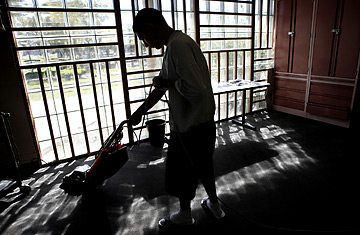
An 18-year-old resident vacuums the day room of the Esperanza Cottage, a housing unit for high-risk males at the Youth Diagnostic and Development Center. Foothill High School is located on the grounds of the Center.
The PTSA, which was launched last October, is the first in the nation to be associated with a juvenile reformatory school; its membership is made up mostly of teachers, guards and officials at the Youth Diagnostic and Development Center, where the school is located and the teens live in secured cinderblock cottages. Only one parent has paid her $6 annual dues, but Murphy has heard from others who plan to sign up during the official PTSA kickoff meeting at an open house at the school this Friday.
Since Foothill is a state-managed school, run jointly by the New Mexico Department of Education and the Children, Youth and Families Department, it cannot by law accept donations the way a normal public school would. But with the help of the PTA, a nonprofit supporting agency, Murphy hopes to be able to raise money for extracurricular activities that states funds cannot be spent on — such things as athletic uniforms, prom dresses and pizza rewards for superior academic performance. She could not have even afforded to put on the upcoming open house, which she hopes to do once a semester from now on, without PTA assistance. Foothill was one of 16 schools nationwide to receive nearly $2,000 from the national PTA as part of the organization's annual Take Your Family to School Week award program. Parents will attend a student-organized assembly, rotate through their children's class schedule, join them for a catered lunch and meet one-on-one with their teachers.
Students are sentenced to the Albuquerque facility from all across New Mexico for crimes ranging from sexual assault to a history of shoplifting. Murphy works hard to make the school as normal, and as positive, as possible. Although the curriculum is standard, teachers face challenges dealing with many students who gave up on school long ago. A student council does meet daily, while a dads' group meets weekly, during which time the young fathers record themselves reading a book to their children, and then have the tape sent home.
Jose Chavarria, 19, is looking forward to the open house and a chance to see his mother and 2-year-old daughter, who are planning to travel 200 miles from their home in Roswell (many of the parents live equally long distances from the school). When he was 17, at the time already a low-level drug dealer for five years, Chavarria shot and wounded a man approaching his car as he was sitting in traffic. Two weeks later, before being apprehended, he shot and killed a woman whom he and his friends feared were going to rat them out to the police. When he turned himself in, Chavarria was charged as a juvenile for the first crime and as an adult for the homicide.
Nine months ago, after being held in a number of traditional juvenile detention centers, he arrived at the school, a two-toned brown building across a grassy field from his cottage named "Esperanza," Spanish for hope. In April, he will receive his adult sentence, which he has already pleaded down from a possible life term to anywhere from 1 to 30 years — and is trying to negotiate even further downward. Chavarria arrived at Foothill unable to read, spell or understand math. Now he is in the 9th grade with the hope that he can convince authorities to let him stay at Foothill until he is 21 and earn his GED before he is transferred to an adult facility. "I'm getting all A's in my classes, but my mother doesn't believe that I can read," he says. "I'm excited to see her."
Murphy wants the parents to see how successful their children, like Chavarria, can be in school and is hopeful they will further encourage them, through the PTA, to get more involved in their education. While she knows that the more involved parents are, the better their children will perform, she also is acutely aware that many of her students are where they are now at least partly because of a lack of attention. With this is mind, she didn't know what to expect when she sent out invitations to the open house. Already more than 80% of the parents have said they will attend, which has Murphy and school officials scrambling to accommodate everyone. "It's like sending out a wedding list for 500 guests, expecting 250 to attend," she says. For both the school and the kids' sake, she hopes a good number will want to keep on coming back.
